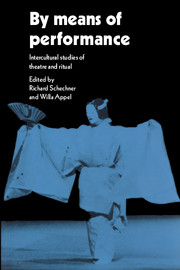Book contents
- Frontmatter
- Contents
- List of figures
- Notes on contributors
- Concerning Victor Turner
- Introduction
- 1 Are there universals of performance in myth, ritual, and drama?
- 2 Magnitudes of performance
- 3 Liminality: a synthesis of subjective and objective experience
- 4 The Yaqui deer dance at Pascua Pueblo, Arizona
- 5 A Yaqui point of view: on Yaqui ceremonies and anthropologists
- 6 Performance of precepts/precepts of performance: Hasidic celebrations of Purim in Brooklyn
- 7 The significance of performance for its audience: an analysis of three Sri Lankan rituals
- 8 What does it mean to “become the character”: power, presence, and transcendence in Asian in-body disciplines of practice
- 9 Korean shamans: role playing through trance possession
- 10 The practice of noh theatre
- 11 The profanation of the sacred in circus clown performances
- 12 Ethnographic notes on sacred and profane performance
- 13 The spatial sense of the sacred in Spanish America and the American South and its tie with performance
- 14 Space and context
- 15 The transformation of consciousness in ritual performances: some thoughts and questions
- 16 Universals of performance; or amortizing play
- Appendix
- Bibliography
- Index
12 - Ethnographic notes on sacred and profane performance
Published online by Cambridge University Press: 05 June 2012
- Frontmatter
- Contents
- List of figures
- Notes on contributors
- Concerning Victor Turner
- Introduction
- 1 Are there universals of performance in myth, ritual, and drama?
- 2 Magnitudes of performance
- 3 Liminality: a synthesis of subjective and objective experience
- 4 The Yaqui deer dance at Pascua Pueblo, Arizona
- 5 A Yaqui point of view: on Yaqui ceremonies and anthropologists
- 6 Performance of precepts/precepts of performance: Hasidic celebrations of Purim in Brooklyn
- 7 The significance of performance for its audience: an analysis of three Sri Lankan rituals
- 8 What does it mean to “become the character”: power, presence, and transcendence in Asian in-body disciplines of practice
- 9 Korean shamans: role playing through trance possession
- 10 The practice of noh theatre
- 11 The profanation of the sacred in circus clown performances
- 12 Ethnographic notes on sacred and profane performance
- 13 The spatial sense of the sacred in Spanish America and the American South and its tie with performance
- 14 Space and context
- 15 The transformation of consciousness in ritual performances: some thoughts and questions
- 16 Universals of performance; or amortizing play
- Appendix
- Bibliography
- Index
Summary
How does a performance relate to life? One may speak of a performance as condensed, distilled, concentrated life – an occasion when one's energies are intensely focused. One may also speak of performances as set apart, marked by various signals as distinct from ordinary routines of living. And one must speak of performances as embodying meaning. A performance is not necessarily more meaningful than other events in one's life, but it is more deliberately so; a performance is, among other things, a deliberate effort to represent, to say something about something.
If a performance is an action which attempts to communicate meaning, then it is never purely “form.” As I write (which is one kind of performance), I do not merely typewrite; if I did so, I could attend to form rather than meaning, as a typist could do in perfectly replicating a manuscript in a foreign language the typist does not understand. But as a would-be writer, I must struggle to ignite form with meaning, which is writing as opposed to typewriting.
These commonplace observations about the necessity of uniting form and meaning in a performance – exemplified here by the event at hand, writing, but normally by the more public performances, such as plays, rituals, concerts, and the like – leads us to our comparison of sacred and profane performances.
- Type
- Chapter
- Information
- By Means of PerformanceIntercultural Studies of Theatre and Ritual, pp. 208 - 220Publisher: Cambridge University PressPrint publication year: 1990
- 3
- Cited by



